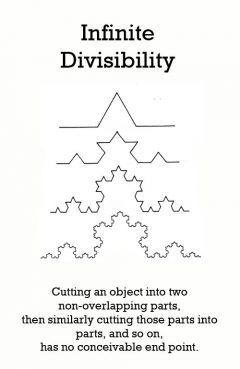Infinite Divisibility

Release Date: //-460
Country of Release:
Length:
MPAA:
Medium: Paradox
Genre:
Release Message:
Description: This is the most challenging of all the paradoxes of plurality. Consider the difficulties that arise if we assume that an object theoretically can be divided into a plurality of parts. According to Zeno, there is a reassembly problem. Imagine cutting the object into two non-overlapping parts, then similarly cutting these parts into parts, and so on until the process of repeated division is complete. Assuming the hypothetical division is ñexhaustiveî or does comes to an end, then at the end we reach what Zeno calls ñthe elements.î Here there is a problem about reassembly. There are three possibilities. (1) The elements are nothing. In that case the original objects will be a composite of nothing, and so the whole object will be a mere appearance, which is absurd. (2) The elements are something, but they have zero size. So, the original object is composed of elements of zero size. Adding an infinity of zeros yields a zero sum, so the original object had no size, which is absurd. (3) The elements are something, but they do not have zero size. If so, these can be further divided, and the process of division was not complete after all, which contradicts our assumption that the process was already complete. In summary, there were three possibilities, but all three possibilities lead to absurdity. So, objects are not divisible into a plurality of parts.